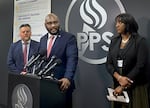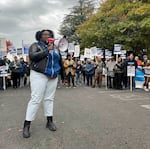Educators in Oregon’s largest school district are entering the second week of a strike as Portland Public Schools and the Portland Association of Teachers continue negotiating a new contract.
The strike started last Wednesday, Nov. 1. Since then, national, state and local players in education and politics have weighed in on the ongoing discussions, sending letters to school board members and speaking at rallies at schools across the city. But the fundamental differences between the two sides remain.
At a press conference Monday morning, Superintendent Guadalupe Guerrero weighed in on some of the new voices calling for an end to the strike, including a group of 16 Portland legislators who asked PPS to cut “superfluous administration spending” in a letter last week.
“Over the last week, people have called on our district to make budget cuts. That’s been our reality since we began bargaining in January,” Guerrero said.
“Our current proposal will require PPS to make $51 million in cuts over the next three years. It will require the one-time reserves being used, bringing us down to our minimum. Already, we have begun to contemplate what those reductions might look like, beginning with the central office administration taking a hard look at where it needs to make reductions.”
As the strike continued into a new week on Monday, the district and union met for another negotiation session with a state mediator. That’s after three straight days of sessions Friday, Saturday and Sunday.
Financial disagreements remain
Among the major sticking points in the negotiation are class sizes and teacher compensation. The union has also called for the district to address health and safety concerns, like mold and rodents, in district school buildings. Both sides seem to be operating with different sets of financial figures, which has muddied discussions and led to calls for cuts in some places and increases in others.
PPS Chief of Research, Assessment, and Accountability Renard Adams said each side’s “budget experts” have met to compare notes, but not recently.
“There’s not agreement on the numbers,” Adams said. “We’ve repeatedly asked them to show us what areas they would propose we cut in order to make the investments they’re asking for. So far, we’ve not gotten concrete answers: we continue to hear, ‘the money is there,’ and that just simply isn’t concrete enough for us to identify where we could make reductions or redirections in order to meet their needs.”

(Left to right) Portland Public Schools Superintendent Guadalupe Guerrero, Renard Adams, a member of the Portland Public Schools’ bargaining team and chief of research, assessment and accountability, and Deputy Superintendent of Instruction and School Communities Cheryl Proctor, during a press conference held at the PPS district office in Portland, Ore., Nov. 6, 2023.
Elizabeth Miller / OPB
Adams said the two parties met in small groups over the weekend on topics including planning time for teachers and class size. But he said Sunday the disagreements remained.
In their letter to school board members, legislators claimed PPS is spending less in the classroom and more on administration than other districts. Guerrero defended the district’s spending, saying administrative ranks include instructional support coaches and other folks who are in schools every day.
“Maybe we spent a little bit more centrally supporting schools directly, but I think we’re one of the districts who also demonstrated a counternarrative to how students are doing across the state — where there needs to be a lot of work,” Guerrero said. Earlier this fall, PPS saw more progress in state tests on reading and math compared to the state.
Guerrero said he’d “invite a dialogue” on how school systems spend their money to support students, especially students of color.
Salem lawmakers press district on funding priorities
As Guerrero was gearing up to speak Monday, a group of legislators and union leaders was holding another press conference in Salem.
“Teachers want to teach but our students aren’t getting what they need right now,” said PAT Vice President Jacque Dixon. “Our classrooms are under-resourced and despite the best efforts of our educators, students need more support than ever before and they aren’t getting it.”
Sen. Michael Dembrow, D-Portland, chair of the Senate Education Committee, once served as the union president for faculty while teaching at Portland Community College. He said the strike is happening largely because of a “sense of distrust among the parties and a sense among the teachers that they are not being respected.”
Sen. Elizabeth Steiner, D-Portland, one of the state’s lead budget writers, said it’s “frustrating” that the school district is trying to blame lawmakers for lack of funding.
“When Superintendent Guerrero testified in front of the Legislature that we should fund (PPS) at $10.3 billion, which we did, it feels a little disingenuous to have them come back and say actually we can’t do that because you didn’t give us enough money.”
Steiner said she believes teachers need to be compensated fairly and noted many other teachers’ demands, such as “simple health and safety things, like temperature in the classroom so that kids can learn and be safe and healthy.”
“It’s not the Legislature’s job to micromanage school districts,” Steiner said. “It is our job to provide funding that we believe is the best we can possibly do, given our other constraints on our budget which we did. And now it’s the district’s job to prioritize the most important resource they have, which is their teachers.”

Portland Association of Teachers picketers demonstrate on an overpass over Highway 26 in Southwest Portland at the Sylvan Road exit the morning of Friday, Nov. 3, 2023.
Kristyna Wentz-Graff / OPB
As local school officials and elected state leaders debate whether school advocates got the money they lobbied for in the last legislative session, the head of the Oregon agency responsible for recommending school funding levels says the state’s pattern has always been to fall short. For more than 20 years, the Quality Education Commission has recommended funding levels to lawmakers, and its recommendations have never been met with spending in line with the commission’s advice.
QEC chair John Rexford told OPB’s Think Out Loud Monday that the state is roughly $1.5 billion short of what his commission recommended. Rexford said from budget cycle to budget cycle, state spending is often 15 to 20% short of what his commission concludes is necessary for a “quality education.”
“Most of that money would go to hiring more staff, both more licensed staff in the classroom and supporting the classroom as well as paraprofessionals supporting the classroom,” Rexford said.
Rexford acknowledged the Legislature’s challenge — to fund public schools along with countless other programs — with limited state funding.
School board members respond to calls to get involved
Last week, PAT, Oregon Gov. Tina Kotek, and the group of Portland legislators asked school board members to show up for negotiation sessions. This past weekend, board members Andrew Scott, Julia Brim-Edwards, and Patte Sullivan showed up to sessions.
PPS Chief of Staff Jonathan Garcia expressed his appreciation to the board members in a post on X, formerly known as Twitter. Board member and Multnomah County Commissioner Julia Brim-Edwards also shared photos from sessions this weekend. The board will meet for its regular public meeting Tuesday, the first since the strike began.
Board members are expected to continue showing up to mediation sessions as their schedules allow.
PPS said its bargaining team is prepared to meet every day this week and into the weekend to find a solution, with a focus on getting students back to school soon.
“They [students] deserve to be in class,” Guerrero said. “At the same time, our teachers deserve fair employment terms, but our community also deserves a sustainable contract that balances all of our students’ many needs.”
But Guerrero also said the Portland teachers strike could be a sign of things to come when it comes to labor unions working in Oregon education.
“I hate to foreshadow eerily here,” he said. “You’re going to see an increasing number of situations like ours happening up and down the state unfortunately.”
Reporting by Lauren Dake, Rolie Hernandez and Dave Miller contributed to this story.






























